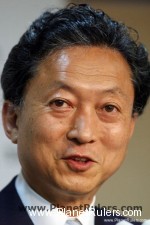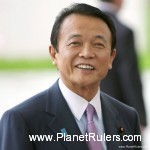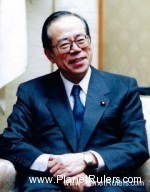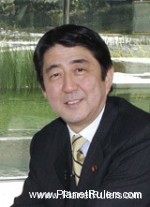Yukio Hatoyama, Former Prime Minister of Japan
(On June 2, 2010 Prime Minister Yukio Hatoyama announced his resignation)
Yukio Hatoyama (Hatoyama Yukio, born 11 February 1947) is a Japanese politician who has been Prime Minister of Japan since September 2009. First elected to the House of Representatives in 1986, Hatoyama became President of the Democratic Party of Japan (DPJ), the main opposition party, in May 2009. He then led the party to victory in the August 2009 general election, defeating the long-governing Liberal Democratic Party (LDP). He represents the 9th district of Hokkaido in the House of Representatives.
Early life and family
Ichiro Hatoyama and his two grandsons, Yukio and Kunio Hatoyama comes from a prominent Japanese political family which has been called the “Kennedy family of Japan.” Hatoyama, who was born in Bunkyo, Tokyo, is a fourth generation politician. His paternal great-grandfather, Kazuo Hatoyama, was speaker of the House of Representatives of the Diet of Japan from 1896 to 1897 during the Meiji era. Kazuo later served as the president of Waseda University. His paternal great-grandmother, Haruko Hatoyama, was a co-founder of what is known today as Kyoritsu Women’s University. His paternal grandfather, Ichiro Hatoyama, was a major politician; he served as Prime Minister and was a founder and the first President of the Liberal Democratic Party (Jiyu-Minshuto?, 1954-1955). As Prime Minister, he restored diplomatic relations with the Soviet Union, which cleared the way for Japan’s membership in the United Nations. Hatoyama is the son of Iichiro Hatoyama, who was Foreign Minister for a time. His mother, Yasuko Hatoyama, is a daughter of Shojiro Ishibashi, the founder of Bridgestone Corporation and heir to his significant inheritance. Yasuko Hatoyama is known as the “Godmother” within the Japanese political world for her financial contributions to both of her sons’ political ambitions. In particular, Yasuko donated billions of yen when Kunio and Yukio co-created the Democratic Party of Japan (DPJ) in 1996 to help establish her sons’ fledgling political party. His younger brother, Kunio Hatoyama, served as Minister of Internal Affairs and Communications under Prime Minister Taro Aso until 12 June 2009. Hatoyama graduated from the University of Tokyo in 1969 and received a Ph.D. in managerial engineering from Stanford University in 1976. He met his wife, Miyuki Hatoyama, while studying at Stanford. The couple married in 1975 after she divorced her previous husband. The couple’s son, Kiichiro, is a visiting engineering researcher at Moscow State University. Hatoyama worked as a research assistant at the Tokyo Institute of Technology and later moved to Senshu University and was promoted to assistant professor.
Political career
Hatoyama ran for a seat in Hokkaido’s 38th district and was elected to the House of Representatives in 1986 representing the ruling LDP. In 1993 he left the LDP to form the New Party Sakigake with Naoto Kan, Masayoshi Takemura and Shuhei Tanaka. He and Kan then left to join the newly formed Democratic Party of Japan. Hatoyama and his younger brother, Kunio Hatoyama, co-created the Democratic Party of Japan (DPJ) in 1996, using billions of yen donated by their mother, Yasuko. Kunio Hatoyama eventually left the DPJ, saying the party had drifted too far to the left from its original centrist roots, and rejoined the Liberal Democratic Party (LDP). Yukio remained with the party through its merger with several other opposition parties in 1998. He became the DPJ Party Chairman and leader of the opposition from 1999 to 2002, when he resigned after taking responsibility for the confusion that arose from rumors of mergers with Ichiro Ozawa’s then Liberal Party. He was Secretary-General of the DPJ before he succeeded Ozawa as party leader following Ozawa’s resignation on 11 May 2009. Hatoyama was chosen by fellow party representatives on 16 May 2009, winning 124 of the 219 votes and defeating rival Katsuya Okada. Hatoyama has indicated that his wife, Miyuki Hatoyama, will take a prominent role for a Japanese First Lady during his administration. Because of his quirky hairstyle and eccentric manner, he is known by his supporters and his opposition alike as “ET” or “The Alien”, a nickname his wife states he earned because of how different he is from old-style Japanese politicians. She claims he is not motivated by personal interest or greed.
LINK: http://en.wikipedia.org/wiki/Yukio_Hatoyama
Taro Aso, Former Prime Minister of Japan
Liberal Democratic Party
Member of the House of Representatives
Fukuoka Prefecture District No. 8 (Elected 9 times)
Curriculum Vitae
20 September 1940 Born
March 1963 Graduated from Faculty of Politics and Economics, Gakushuin University
August 1966 Joined Aso Industry
May 1973 President and CEO of Aso Cement Co., Ltd. (until December 1979)
January 1978 Chairman, Japan Junior Chamber, Inc. (until December)
October 1979 Elected Member of the House of Representatives for the first time, elected nine times since.
December 1988 Vice Minister for Education, Sports, Science and Culture (until June 1989)
March 1990 Director, Education Division, Liberal Democratic Party (LDP) (until December 1990)
January 1991 Chairman, Special Committee on Coal Issues, House of Representatives (HR) (until November 1991)
November 1991 Chairman, Standing Committee on Foreign Affairs, HR (until January 1993)
December 1992 Director, Foreign Affairs Division, LDP (until August 1993)
August 1993 Deputy Secretary-General, LDP (until September 1995) November 1996 Minister of State, Economic Planning Agency (until September 1997)
November 1998 Chairman, Special Committee on Fiscal Structure Reform, HR (until December 1998)
January 2001 Minister of State for Economic and Fiscal Policy (until April 2001)
April 2001 Chairman, Policy Research Council, LDP (until September 2003) September
2003 Minister for Internal Affairs and Communications (until October 2005) October
2005 Minister for Foreign Affairs (re-appointed September 2006)
24 September, 2008 – Elected Prime Minister of Japan
Yasuo Fukuda, Former Prime Minister of Japan
Fukuda was born in Takasaki, Gunma, the eldest son of politician (later the 67th Prime Minister) Takeo Fukuda.He grew up in Setagaya, Tokyo, attending Azabu High School and graduating from Waseda University in 1959 with a degree in economics. After university, he joined Maruzen Petroleum (now part of the Cosmo Oil Company). He was only minimally involved in politics over the next seventeen years, working his way up to section chief as a typical Japanese “salaryman”. He was posted to the United States from 1962 to 1964.
While his father Takeo Fukuda was prime minister from 1976 to 1978, Yasuo became a political secretary. From 1978 to 1989, he was a director of the Kinzai Institute for Financial Affairs, serving as a trustee from 1986 onward.
Fukuda ran for the House of Representatives in 1990 and won a seat. He was elected deputy director of the Liberal Democratic Party in 1997 and became Chief Cabinet Secretary to Yoshiro Mori in October 2000. He resigned his position as Chief Cabinet Secretary on 7 May 2004 amid a large political scandal related to the Japanese pension system.
Fukuda was considered a contender for the leadership of the LDP in 2006, but on 21 July he decided that he would not seek the nomination. Instead, Shinzo Abe succeeded Junichiro Koizumi as leader of the LDP and Prime Minister of Japan.
One of his most noted policy goals is to end prime ministerial visits to Yasukuni Shrine. In June 2006, Fukuda joined 134 other lawmakers in proposing a secular alternative to the shrine, citing constitutional concerns.
Following Abe’s resignation in September 2007, Fukuda announced that he would run in the Liberal Democratic Party leadership election, which would also determine the prime minister, given the LDP’s majority in the House of Representatives. Fukuda received a great deal of support in his bid, including that of the LDP’s largest faction, led by Foreign Minister Nobutaka Machimura, of which Fukuda is a member.Finance Minister Fukushiro Nukaga, who initially had intended to run for the leadership, also backed Fukuda. Fukuda’s only competitor for the leadership, Taro Aso, publicly acknowledged the likelihood of his own defeat a week before the election.
In the election, on 23 September, Fukuda defeated Aso, receiving 330 votes against Aso’s 197. Fukuda was formally elected as Japan’s 91st prime minister on 25 September. He received 338 votes, almost 100 more than necessary for a majority, in the House of Representatives; although the House of Councillors (the upper house), led by the opposition Democratic Party, elected Ichiro Ozawa over Fukuda by a margin of 133 to 106. This deadlock was then resolved in favor of the lower house’s choice, according to Article 67 of the Constitution.
Fukuda and his cabinet were formally sworn in by Emperor Akihito on 26 September.
Shinzo Abe, Former Prime Minister of Japan
Shinzo Abe was born into a distinguished political family. His father was Shintaro Abe, former secretary-general of the Liberal Democratic Party (LDP), and his grandfather was former Prime Minister Nobusuke Kishi. Following graduation from the Department of Political Science of the Faculty of Law at Seikei University in 1977, Mr. Abe studied politics at the University of Southern California. On his return to Japan, Mr. Abe began to work at the Kobe Steel Ltd., in New York, Kakogawa, Tokyo and continued there until 1982. He then served as executive assistant to the Minister for Foreign Affairs, private secretary to the chairperson of the LDP General Council, and then as private secretary to the LDP secretary-general. After his father’s death in 1991, Mr. Abe organized a network of supporters and established Shinzo Abe supporters’ office. In 1993, Mr. Abe received the highest vote count in the Yamaguchi 1st District in his fast run for the House of Representatives. He was appointed to the House of Representatives Committee on Foreign Affairs, and also served as director of the LDP Social Affairs Division, where he focused on the pension and the social security systems. He has served as deputy chief cabinet secretary from 2000 to 2003 September in the Mori and Koizumi Cabinets. Then he has appointed to the Secretary General of LDP. He was recently re-elected in the general election for a forth term under the 2003 general election.
Mr. Abe, with his sincere personality, has attracted attention from the public. He has been active as a government negotiator on behalf of the families of Japanese abductees who have placed their trust in his efforts.





